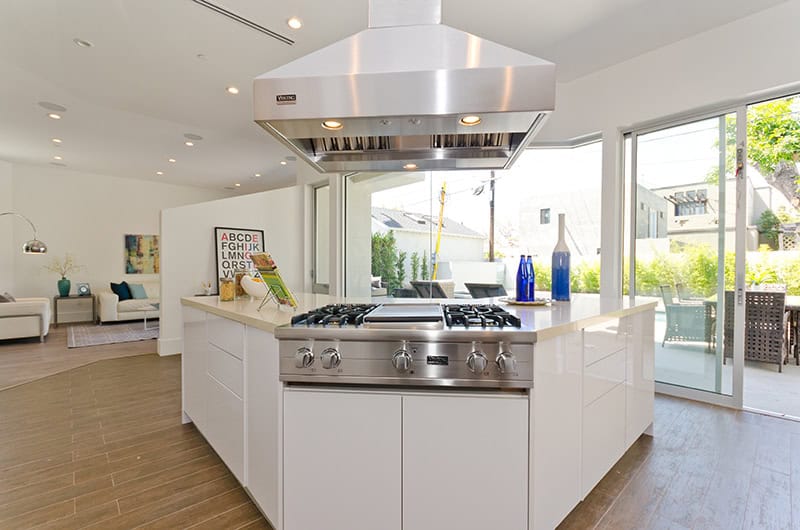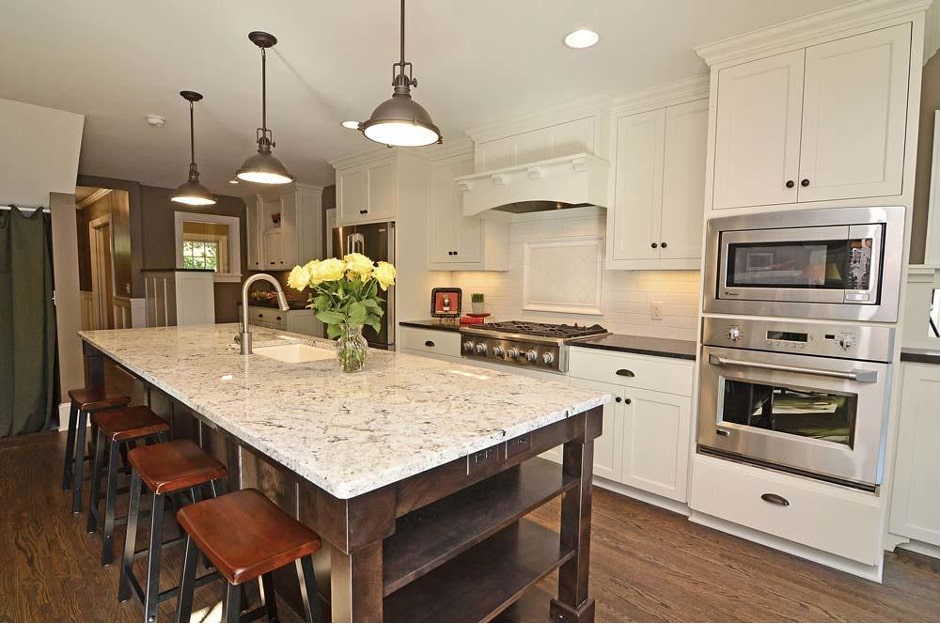Imagine standing in your outdated kitchen, envisioning gleaming new countertops, modern appliances, and stylish cabinetry. As you plan your dream kitchen remodel, a surprising question pops up: can this renovation be tax deductible? It’s a common query among homeowners eager to understand the financial implications of their renovation projects. In this blog post, we’ll explore the ins and outs of tax deductions for kitchen remodeling in the USA.
Did you know that home improvement projects, including kitchen remodels, are incredibly popular in the United States? According to a survey by Houzz, kitchens are the most renovated room in American homes, with over 27% of respondents undertaking a kitchen renovation in the past year. Not only can a kitchen remodel transform your living space, but it can also significantly increase your home’s value. However, understanding the potential tax benefits of such a project can be just as important as choosing the right backsplash.
So, let’s dive into the main question: Is a kitchen remodel tax deductible? We’ll break down the complexities of tax deductions, discuss eligibility criteria, and provide real-life examples to help you navigate the financial aspects of your kitchen remodel.
How Does Tax Deduction Work for Home Improvements?
Before we delve into the specifics of kitchen remodeling, it’s crucial to understand how tax deductions work for home improvements. Tax deductions reduce your taxable income, thereby lowering the amount of tax you owe. However, not every home improvement project is eligible for tax deductions.
Tax Deductions, Tax Credits, and Capital Improvements
Firstly, it’s essential to differentiate between tax deductions, tax credits, and capital improvements:
- Tax Deductions: These reduce your taxable income, which in turn reduces the amount of tax you owe. Common examples include mortgage interest and charitable donations.
- Tax Credits: These provide a dollar-for-dollar reduction in the amount of tax you owe. For example, if you owe $2,000 in taxes but qualify for a $500 tax credit, your tax bill is reduced to $1,500.
- Capital Improvements: These are substantial upgrades that add value to your home, prolong its useful life, or adapt it for new uses. Capital improvements can potentially increase your home’s basis, which is important when calculating capital gains tax if you sell your home.
The Internal Revenue Service (IRS) governs tax regulations in the USA and provides guidelines on what qualifies as a deductible expense. Generally, everyday home repairs are not deductible, but capital improvements may offer tax benefits.

Is Kitchen Remodeling Tax Deductible?
In short, a kitchen remodel is generally not directly tax deductible. However, it can offer indirect tax benefits. Kitchen remodeling is typically considered a capital improvement, which can increase your home’s basis and potentially reduce your taxable gain when you sell the property.
Guidelines for Home Improvement Deductions
According to IRS guidelines, home improvements must meet specific criteria to be considered for tax benefits. These improvements should:
- Add substantial value to your home.
- Prolong the useful life of your home.
- Adapt your home for new uses.
Kitchen remodeling projects often meet these criteria. For instance, installing new cabinets, countertops, and energy-efficient appliances can add significant value to your home. However, routine repairs, such as fixing a leaky faucet, do not qualify as capital improvements.
To better understand how kitchen remodeling fits into these guidelines, let’s explore key IRS rules and publications that address home improvements and tax deductions.
Criteria for Deduction Eligibility
Understanding the eligibility criteria for tax deductions related to kitchen remodeling involves examining several key factors:
Capital Improvements vs. Repairs
The IRS distinguishes between capital improvements and repairs, with important implications for tax deductions.
- Capital Improvements: These are permanent additions or upgrades that add value to your home, extend its life, or adapt it for new uses. Examples include kitchen remodeling, adding a deck, or installing a new roof. Capital improvements can increase your home’s basis, which can reduce your taxable gain when you sell the property.
- Repairs: These are maintenance tasks that keep your home in good working condition but do not add significant value or extend its life. Examples include fixing a broken window, repairing a leaky roof, or painting a room. Repairs are not tax deductible.
Since kitchen remodeling typically involves substantial upgrades that add value to your home, it is considered a capital improvement. As a result, while you can’t deduct the cost of a kitchen remodel on your annual taxes, it can increase your home’s basis, which may provide tax benefits when you sell your home.
Medical Expenses and Home Improvements
Home improvements made for medical reasons may be tax deductible if they meet certain IRS criteria. If you or a family member has a medical condition that necessitates specific modifications to your home, these improvements could qualify as medical expenses.
For example, if you remodel your kitchen to accommodate a wheelchair by lowering countertops and widening doorways, these modifications may be deductible as medical expenses. To claim these deductions, you must itemize your deductions on your tax return and provide documentation of the medical necessity and the costs involved.
Energy Efficiency and Tax Credits
The federal government offers tax credits for energy-efficient home improvements, which can include certain aspects of a kitchen remodel. These credits are designed to encourage homeowners to make environmentally friendly upgrades.
- Energy-Efficient Appliances: Installing energy-efficient appliances, such as refrigerators, dishwashers, and ovens, can qualify for federal tax credits.
- Solar Panels: Adding solar panels to your home can also qualify for significant tax credits.
By incorporating energy-efficient upgrades during your kitchen remodel, you can potentially reduce your tax liability. For example, the Energy Efficient Home Improvement Credit allows homeowners to claim a credit for a percentage of the cost of qualified energy-efficient improvements.
Home Office Deduction
If you use a portion of your home, including your kitchen, exclusively and regularly for business purposes, you may qualify for a home office deduction. This deduction allows you to claim a portion of your home expenses, including improvements, based on the percentage of your home used for business.
However, to qualify for the home office deduction, your kitchen must be used exclusively for business purposes, which is rare. More commonly, home office deductions apply to designated office spaces rather than kitchens.
Business Use or Rental Property
If your home, including the kitchen, is used for business purposes or as a rental property, you may be able to deduct certain remodeling expenses. For example:
- Rental Property: If you remodel the kitchen in a rental property, you can depreciate the cost of the improvements over the property’s useful life.
- Business Use: If you use your home for business purposes, such as running a daycare, you may be able to deduct a portion of the remodeling expenses.
In both cases, it’s essential to keep detailed records and consult with a tax professional to ensure you meet IRS requirements and maximize your deductions.
Case Studies and Real-Life Examples
To illustrate how kitchen remodeling can impact taxes, let’s look at some real-life examples and hypothetical scenarios.
Case Study 1: Energy Efficiency Upgrades
John and Sarah decide to remodel their kitchen, focusing on energy efficiency. They install Energy Star-rated appliances, upgrade to energy-efficient windows, and add solar panels to their home. These improvements qualify for federal tax credits, allowing them to reduce their tax liability by a significant amount. Additionally, the energy-efficient upgrades increase their home’s value and reduce their utility bills.
Case Study 2: Medical Necessity
Jane needs to remodel her kitchen to accommodate her elderly mother, who uses a wheelchair. She lowers the countertops, widens the doorways, and installs pull-out shelves for easier access. These modifications qualify as medical expenses, allowing Jane to deduct a portion of the costs on her tax return. The remodel not only makes the kitchen more accessible but also adds value to her home.
Conclusion
While kitchen remodeling is generally not directly tax deductible, it can offer indirect tax benefits through capital improvements, energy efficiency upgrades, and medical necessity modifications. Understanding the criteria for tax deductions and credits can help you maximize the financial benefits of your kitchen remodel.
By increasing your home’s basis, a kitchen remodel can reduce your taxable gain when you sell the property. Additionally, energy-efficient upgrades can qualify for federal tax credits, and medically necessary modifications can be deductible as medical expenses. For those using their home for business or rental purposes, there may be additional opportunities to deduct remodeling expenses.
Ultimately, navigating the complexities of tax deductions for kitchen remodeling requires careful planning and consultation with a tax professional. By staying informed and taking advantage of available tax benefits, you can make the most of your kitchen remodel both aesthetically and financially.
So, the next time you find yourself dreaming of a new kitchen, remember that while the project itself may not be directly tax deductible, there are ways to leverage tax benefits to offset some of the costs. Happy remodeling!
Kitchen Remodeling with Diditan Group
Transform your kitchen with Diditan Group, your trusted home builder in Los Angeles, California. Our expert kitchen remodeling services bring your dream kitchen to life with stunning designs and top-quality craftsmanship. Whether it’s a modern makeover or a classic update, we’ve got you covered. Contact us for a free consultation and start your kitchen transformation now!
Frequently Asked Questions
Q.1 Can a kitchen remodel be a tax write-off?
Ans Yes, a kitchen remodel can be a tax write-off if it qualifies as a home improvement expense, particularly for rental properties or home offices. To qualify, the remodel must add value to the property and not just be a repair. Always consult a tax professional for specific advice.
Q.2 Are home renovations tax deductible in USA?
Ans Home renovations in the USA are generally not tax deductible. However, certain improvements for medical reasons or energy efficiency may qualify for deductions or credits. Always consult a tax professional to understand specific eligibility and ensure compliance with IRS regulations regarding home improvement-related tax benefits.
Q.3 Can you write off remodeling expenses?
Ans Remodeling expenses are typically not tax deductible for personal residences. However, they can add to your home’s cost basis, reducing potential capital gains taxes when selling. Some energy-efficient upgrades may qualify for tax credits. Always consult a tax professional for specific guidance on your situation.
Q.4 Are kitchen appliances tax deductible?
Ans Kitchen appliances are generally not tax deductible for personal residences. However, energy-efficient appliances may qualify for tax credits. If the appliances are for a rental property or home office, they might be deductible as business expenses. Consult a tax professional for personalized advice.







Leave A Comment